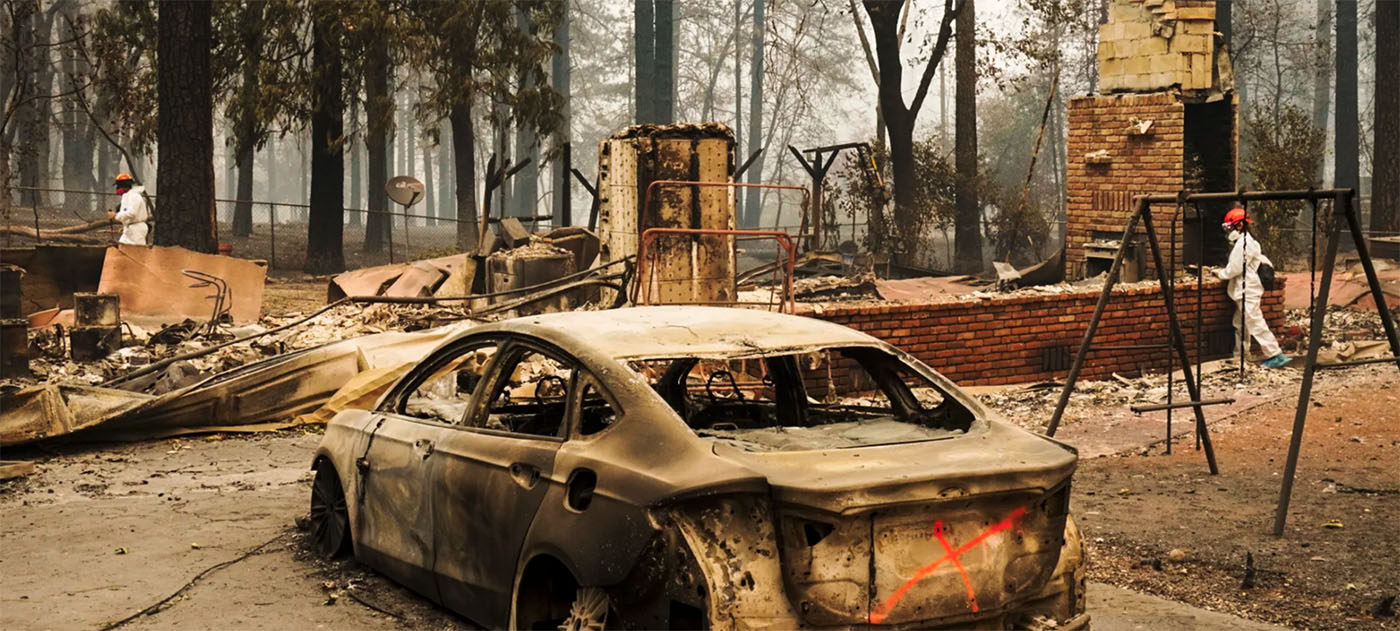
A century of runaway fossil fuel use has fundamentally detached the climate from almost any moorings within the span of recorded human existence. Once-in-a-century heatwaves, storms, floods and fires now happen yearly.
Omar El Akkad
What remains of the Oak Park Motel resembles in a vague, unsettling way a school-fair diorama. The roof is gone and the walls mostly collapsed, the gutted interiors of a dozen or so squat guestrooms visible now from the roadside. Scorch marks surround the places where the doors and windows used to be. Across the one-lane highway, a couple hundred feet down the road, a Mexican restaurant sits in relatively pristine condition. All along the crest of the near and far mountains, the trees turned licorice with burning lean against the ones miraculously untouched. Who knows the reasons behind this haphazard distribution of ruin — probably it’s something to do with wind patterns or material resilience or human intervention. Maybe it’s just luck.
A little more than a year ago, about a half-hour drive from where we live in Oregon, the forests burned — over the course of one of the worst wildfire seasons this part of the continent has ever known. Roughly 400,000 hectares were incinerated, and some 40,000 people forced from their homes. Almost overnight, entire towns ceased to exist. For a while, if you lived here, the fires were the whole of the world. Every night we watched the news on TV, waiting on word of rain. People sealed shut their windows and folded towels under the doorjambs and made a run on air purifiers and listened to terrible advice about boiling rosemary even though it was obvious that boiling rosemary would do nothing to pull that suffocating campfire stink from the air, would make things worse, even. Fear makes one susceptible to miracle cures.
Then finally the rain did come, great sweeping sheets off the Pacific coast. In time the smoke thinned out and the blob of red on the state evacuation map began to shrink. Within a month, most everyone whose home or business wasn’t decimated by the fires had moved on. There were other things to worry about, the election and the pandemic and the cascade of daily absurdities against which the mind, in self-defense, takes refuge in forgetting. To visit the worst-hit places months later, the small sawmill towns that in all likelihood will never recover, is an indecent archeology. All of this feels like it happened so long ago — even though, the following summer, the state lurched through yet another disastrous fire season. Even though it will likely happen again next summer, and the one after that.
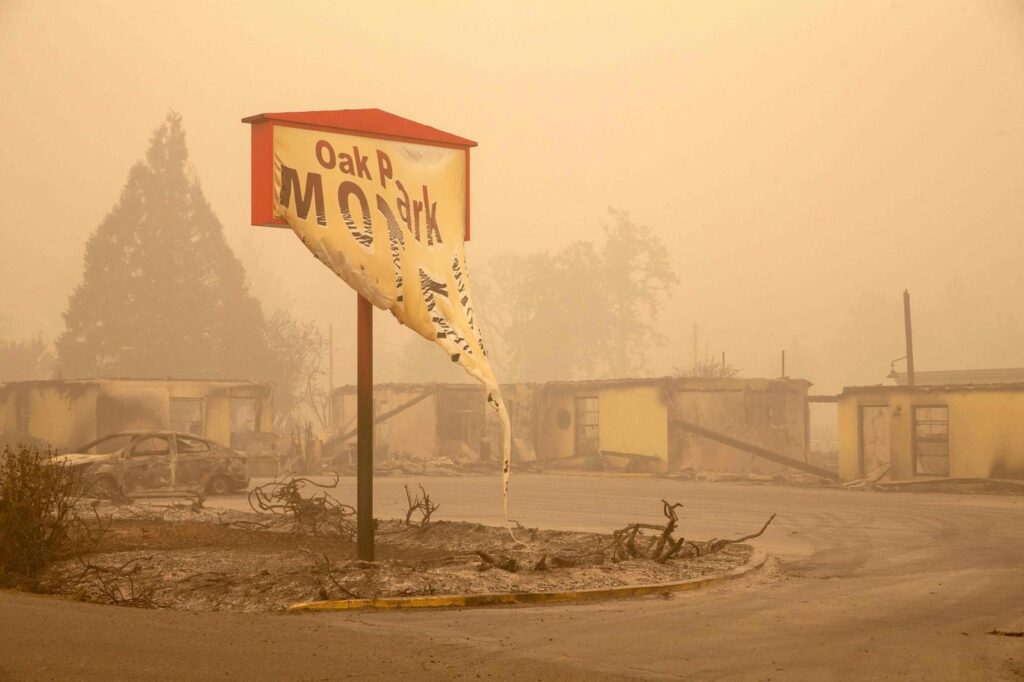
This is what’s normal now. A century of runaway fossil fuel use has fundamentally detached the climate from almost any moorings within the span of recorded human existence. Once-in-a-century heatwaves, storms, floods and fires now happen yearly. Regardless of our ability to meet the watered-down goals of myriad international climate agreements, we will leave our children and grandchildren a planet more physically upended, more precarious, in almost every way.
But even if we have failed utterly in our obligation to prevent or even simply mitigate this reality, we are still at least obligated to consider its most immediate consequence — the millions upon millions of people who will be forced from their homes in the coming decades by this cataclysmic new ordering of the world.
According to the United Nations High Commissioner for Refugees, more than 82 million people were displaced by conflict in 2020 — the highest number ever recorded. Yet as stunning as that figure is, it might come to be thought of in hindsight — like the current wildfires and droughts and floods — not as the terminus of some horrible trend, but the beginning.
It is almost certain that, in the coming few decades, the world will see a mass displacement of human beings almost unmatched in modern history. Depending on how high the seas rise, hundreds of millions of people who call a piece of coastland home might find it underwater. Huge swaths of the Middle East and Africa — already so sweltering that countries such as the United Arab Emirates are experimenting with electrically charged drones designed to shock clouds into producing rain — may soon become too hot for human habitation. Millions upon millions of people will be driven beyond the borders of their home countries by a crisis that has absolutely no concern for borders.
There is, in international law, almost no mechanism for dealing with this kind of forced migration. And unless one is developed and implemented quickly, the defining crisis of the coming decades will play out the way so many prior refugee crises have played out before — first with indifference, then rejection, and finally bloodshed.
A particularly insidious after-effect of colonialism is heat.
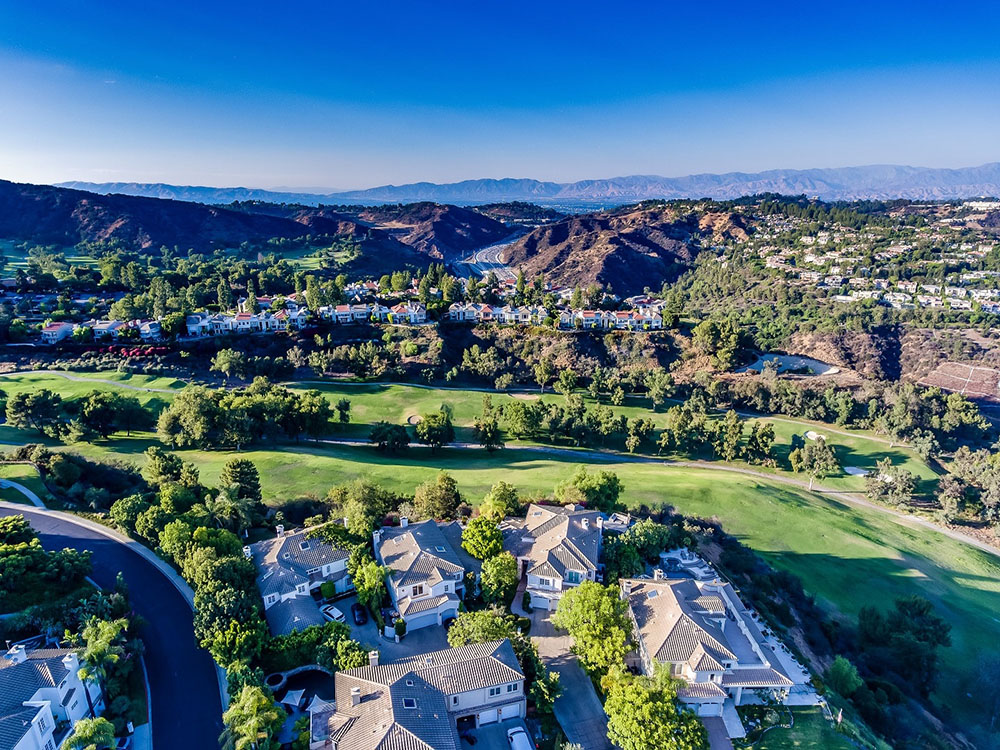
Last month, a landmark study published in Science found that Indigenous people across the United States have lost almost 99 per cent of their historical lands. But beyond the sheer magnitude of the theft, there is also the reality that many tribes were forced to relocate to what settlers thought of as less desirable parts of the continent — a desirability usually determined by temperature and proclivity for drought. As a result, hundreds of years after this displacement began, Indigenous people tend to occupy places that are far more vulnerable to a warming world.
It shows up again and again, this relationship between heat and violence, heat and wealth, heat and power. A couple of years ago, a joint investigation by NPR and the University of Maryland’s Howard Center for Investigative Journalism found that in dozens of American cities, there was an undeniable correlation between a neighborhood’s median income and its average temperature. Time and time again, satellite imagery showed poorer neighborhoods were significantly hotter than wealthier ones, and not by an insignificant margin — as much as ten degrees, in some cases. One of the biggest contributors to this gap was greenery. Rich neighborhoods tend to have more trees lining the streets, which in turn provide shade. Poorer neighborhoods often don’t, and are also more likely to be located next to industrial sites that generate even more heat.
These are not symptoms of a broken system, but rather one functioning exactly as intended. As with virtually every calamity, the present ordering of our political and social systems all but guarantees the first victims will be those with the least power, the least clout, the least resources. A few years ago, before the worst of the fires, we started noticing more and more farmers from California looking for land near Oregon’s fertile central valleys. California had gone through a vicious drought, and some farmers were starting to see the writing on the wall. The ones who could afford it started weighing their options, their backup plans.
For those who can afford it, climate-prompted migration will not be a violent, harried thing. It will be orderly and comfortable, perhaps an inconvenience but certainly not existential. For everyone else, things will look very different.
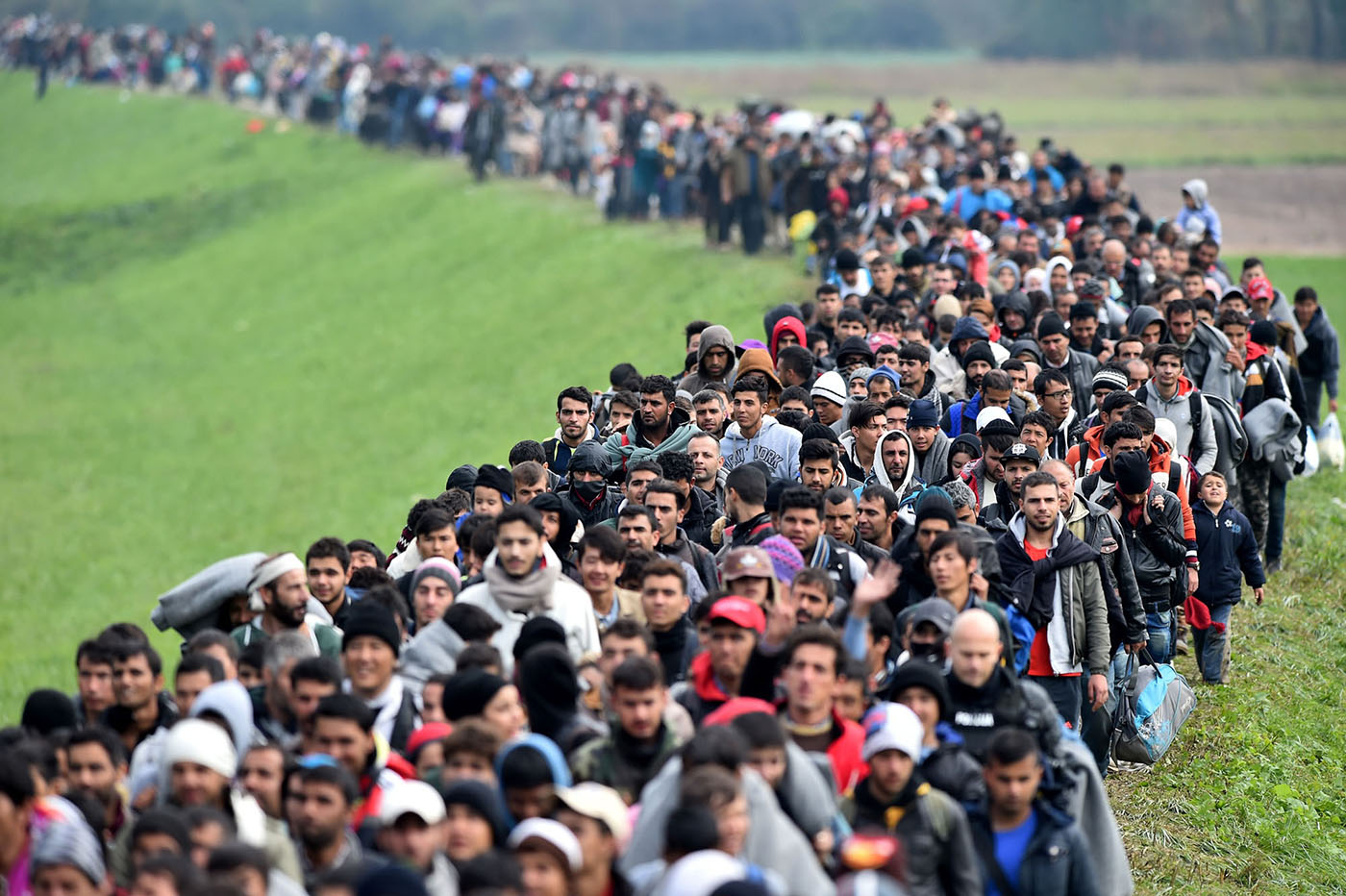
One of my earliest travel memories involves watching my father solemnly swear that he was never a Nazi. Such was one of the requirements for entering America: filling out a form whose myriad questions included one about membership in or support for the Third Reich during a period that predated my father’s birth.
For a certain subset of people on this planet, all travel is like this, from a simple summer trip to permanent migration — an endless series of declarations that one is not a threat.
In many ways, the entire postwar infrastructure of borders and visas and movement control is predicated on a world of clearly definable danger — violent states, violent people, violent actions, all of them discrete and under the jurisdiction of some treaty or law or norm.
It’s a system that has been in place for decades and affords individual governments great leeway not only in defining responsibilities, but also shirking them. One of the reasons the world’s richest countries are so often reluctant to formally recognize acts of genocide, for example, is because recognition necessitates that something be done — there are rules, expectations, precedent.
But in the face of climate change, these mechanism by which human movement is ordered feel hopelessly archaic.
A hurricane season of exceptional violence — exacerbated by a climate change crisis that is itself a product of fossil fuel consumption from which the Western world has overwhelmingly benefited for decades — is a much less discrete thing. A person who flees their home because they know their child will not be able to survive the heatwaves of the coming years is, for all intents and purposes, afforded no protections at all.
According to the United Nations High Commissioner for Refugees, more than 82 million people were displaced by conflict in 2020 — the highest number ever recorded. Yet as stunning as that figure is, it might come to be thought of in hindsight — like the current wildfires and droughts and floods — not as the terminus of some horrible trend, but the beginning.
Even though the Intergovernmental Panel on Climate Change has been warning about climate migration since at least 1992, there are virtually no legally binding international agreements on the issue, and few if any widely accepted definitions of what a climate migrant is. The term “climate refugee” is even more fraught, as a refugee has historically been afforded certain protections by law, none of which apply if the displacement is caused by climate change.
Given that somewhere around 20 million people a year have been displaced by climate-related events in the past decade, the utter lack of coherent policy is indistinguishable from malpractice. This year, the Biden administration began considering special protections for climate refugees — an idea that will undoubtedly face immense criticism from a Republican party that has made fear of the outsider a central load-bearing beam of its political tent. In New Zealand — a relatively prosperous country whose smaller Pacific island neighbors face the most immediate existential consequences of rising sea levels — the government tried implementing similar protections, before quietly shuttering the plan.
Like almost everything to do with the developed world’s response to climate change, it is astounding how little has been done to address a problem so glaringly self-evident. Creating a framework of basic protections for people driven from their homes by climate change would at least reduce some of the chaos around a crisis of mass movement that everyone already knows is coming, and in many ways is already here. But beyond the pragmatic reasons for building such a framework, there is something else — a matter of basic justice.
There is, throughout the West, a longstanding perception of what a good migrant is — useful, malleable to the demands of the dominant culture, eternally grateful. But these perceptions, discriminatory and condescending at their core, are even more so in the age of climate disaster. The Pakistani villager who is forced to flee because of flooding from melting glaciers is not obligated to be grateful to the part of the world whose century of unbridled consumption is at the root of this displacement. When the island of Kiribati sinks into the Pacific, it will do so having contributed essentially nothing to the carbon emissions crisis that helped speed its demise.
The traditional progressive argument for refugee resettlement in this part of the world often relies heavily on moral goodness, the notion that the world’s wealthiest countries should exhibit a spirit of charity to the planet’s most victimized. But this isn’t a matter of charity, it’s one of restitution.
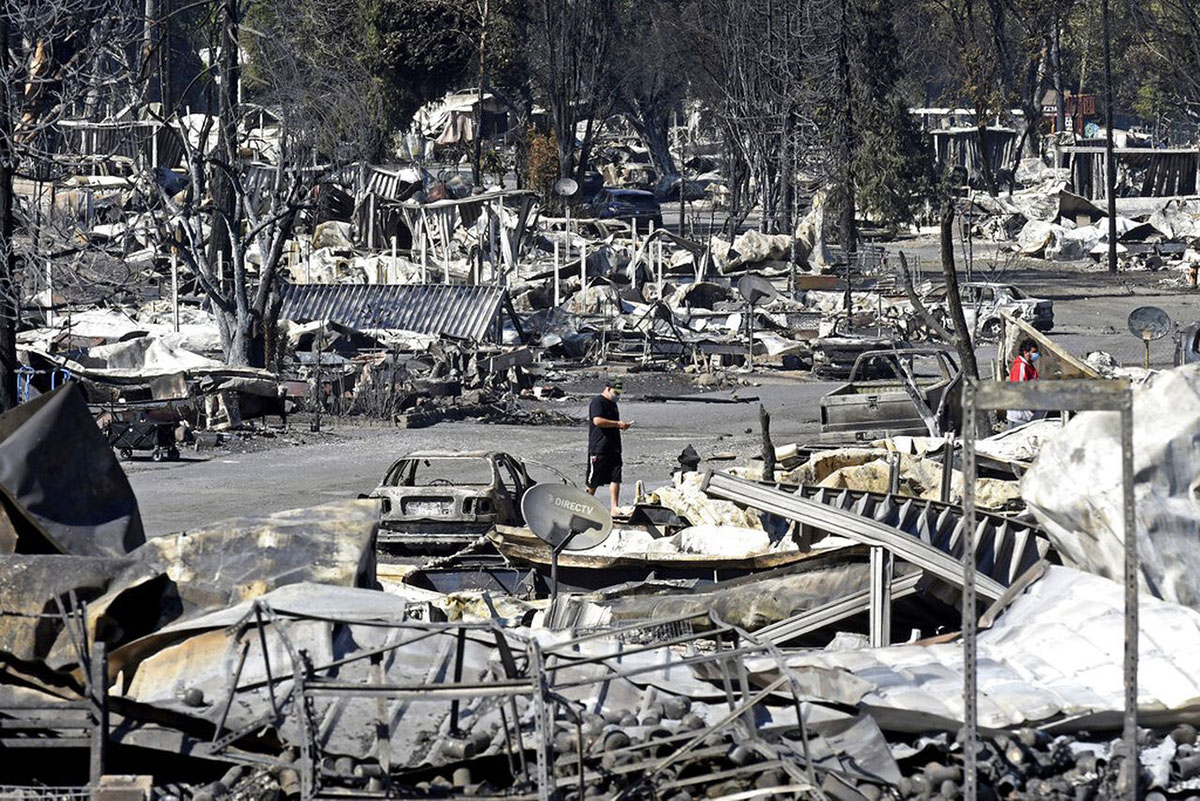
Along the winding one-lane highway that leads through Detroit Lake and Mill City and a smattering of small Oregon towns half-obliterated in the wildfires, some of the charred vehicles still line the side of the road. In the yard of one decimated home, the husk of a minivan serves as holder for a giant Trump lawn sign – a detail that, had I included it in a piece of fiction, would immediately be condemned by any editor worth their salt as too heavy-handed. Further down the road, from the edge of an overpass, an American flag corkscrews in the wind, next to a hand-drawn sign that reads: “We Will Rebuild.”
To drive through these places now is to be reminded that losing is only one half of loss. The other half is this — the constant starting over, the constant rebuilding. It’s also difficult to consider that this is what climate displacement looks like in the most privileged part of the world, a country with massive wealth and emergency infrastructure and the capacity to relocate those whose home is gone. In a grim way, this is what the best-case scenario looks like.
As of this writing, negotiators at the UN climate change summit in Glasgow are working feverishly to come up with a draft agreement acceptable to all parties — from the tiny island nations whose very existence is at stake, to superpowers such as China that still rely heavily on coal. Setting aside the willingness to actually abide by whatever the final draft states, there is, in the end, one central issue that will largely determine the nature and adequacy of the world’s response to climate change in the coming decade — whether the wealthiest nations on the planet are willing to lower their emissions at a fast enough pace to avert the worst global warming scenarios.
There are plenty of ways in which those of us on the privileged end of the consumption spectrum can change on an individual level to reduce our contribution to this crisis — commuting by public transit or other sustainable modes of transport, curbing our appetite for meat, and generally moving away from a lifestyle that prioritizes the instantly accessible abundance of all things at all times. But overwhelmingly, the onus to avert disaster is on the massive industries that exacerbate this nightmare more in a single day than most us will in a lifetime.
And as abstract as it may sound, dismantling the fossil fuel infrastructure is also the single most useful thing everyone in the developed world can do right now to mitigate a refugee crisis a few decades in the future. But regardless how much or little those efforts succeed, the damage already done means there will be, for years and years, an exodus of the world’s most vulnerable people, victims of a passive kind of colonialism whose residual artifacts are not statues of kings or emperors, but the very makeup of the atmosphere, the temperature of the planet. To the wealthy, sheltered places where they will seek refuge, these people owe nothing. That the violence they flee involves no guns or bombs makes it no less real, nor its perpetrators any less culpable.
This is an extended version of an earlier essay that appeared in the Globe and Mail.




Thank you for this clear summary of the looming climate-migration crisis. I will share! As for solutions, on the migration front, there is a growing movement and advocacy for open borders. More here: https://openborders.info/
As for climate change – I’m troubled by the growing trend of separating individuals from “massive industries” – after all, these privileged individuals are most privileged to work at (or aspire to work at) these industries, and derive a lot of their status from said jobs or investments. The focus on solutions needs to be much more specific and call everyone, from individuals to industry, out on their specific (and interrelated) roles in the problem and best plays for solutions. What’s needed now are new metrics to help clarify the actions required. I’ve started an organization, Footprint to Wings, to do just this. Here’s a look at the “First Gigawatt Down” metric. Check it out. Notice all the impending energy colonization that is under consideration in climate solutions talk. This is a big “heads up” on making sure everyone’s clear about the solutions.
PS, we are looking for collaborators, board members, etc. Especially those aware of the colonization & justice issues.